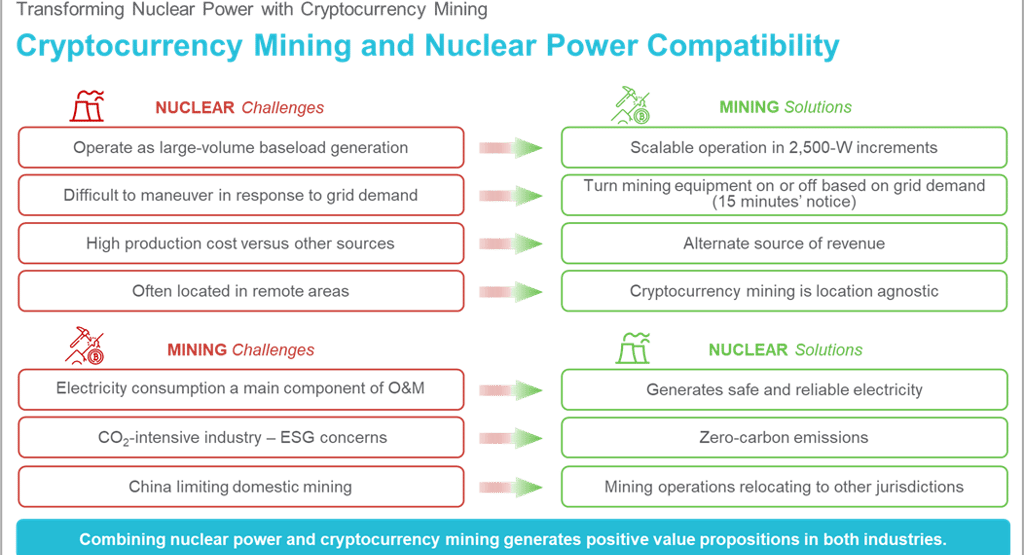France Eyes Bitcoin Mining Powered by Surplus Nuclear Energy
France is weighing a bold proposal to use surplus nuclear energy in Bitcoin mining, turning unused power into millions in revenue. The five-year pilot is backed by the far-right Rassemblement National (RN) party. It would use EDF (Électricité de France)’s excess electricity during low-demand hours, with heat reuse systems warming homes and greenhouses. If approved, it could make France the first EU nation to weave crypto mining into its official energy strategy.
By Jennifer L
11/12/20252 min read


Global Trends: Nuclear Meets Bitcoin Mining
This move in France aligns with growing interest worldwide in matching crypto mining with low-carbon energy. Here are some major facts to know:
Clean Energy Uptake: More than 52% of global Bitcoin mining now runs on sustainable energy. Of this, about 11% comes from nuclear sources.
Fuel Mix Shifts: Coal and gas once dominated Bitcoin’s electricity supply. But the share of nuclear has roughly doubled from 4% in 2021 to over 11%.
Energy Use Scale: Bitcoin mining is energy-intensive—estimated at 176–180 terawatt-hours (TWh) annually, on par with national consumption by countries like Poland or Egypt.
Hashrate Surge: The Bitcoin network’s computing power, or hashrate, continues to rise. As of May 2025, it exceeded 831 exahashes per second (EH/s), a 77% jump from its 2024 low.
Adaptation to Costs: With mining profitability squeezed, miners seek cheap, stable energy like nuclear to stay competitive.
Analysts at ScottMadden argued that Bitcoin mining paired with nuclear energy offers a compelling value proposition—a clean energy use case that could diversify utility income. The business case has only grown stronger as Bitcoin prices rose from about $9,275 in 2020 to over $47,000 by 2021.
France isn’t alone in exploring this pairing. Studies suggest that Bitcoin mining might use extra power wisely. This could cut waste and help the grid stay flexible. For example, South Korean researchers found surplus electricity could be a new revenue stream for the power utility while stabilizing the grid.
Moreover, academic models propose a zero-emissions energy system. This system combines nuclear power with crypto-mining. In this setup, mining serves as a flexible load that helps balance demand. Also, many devices around the world already rely on constant nuclear power.
The Road Ahead: Regulation, Revenue, and Resistance
If the pilot moves forward, EDF and lawmakers would need to finalize guidelines, site mining hubs near existing infrastructure, and ensure regulatory oversight. A six-month feasibility review by the French Council of State is planned, followed by expansion if the pilot succeeds.
When that happens, France could become the first EU nation to legally integrate Bitcoin mining into its energy roadmap. It could turn an economic burden—unused power—into a revenue stream while mitigating grid stress. This would spark debate across Europe—might other nuclear-rich countries follow suit?
From a crypto standpoint, the move elevates mining from underground activity to a strategic industrial asset, redefining its role in the energy economy.
However, the plan still faces political, environmental, and technical hurdles. Yet, as the proposal gains traction, it may shape how nations view the intersection of crypto, energy policymaking, and sustainability.
Contact :
Europe : ECO-LAND Sp. z o.o.
Taxe Id (VAT UE): 1231419490
Office Address: St. Rakowiecka 41 / 3, 02-521 Warsaw, Poland
UK / US / Canada: COBALT FINCH LTD
Registration number : 16614169
Office Address: Rex House 4-12 Regent Street, London, England, SW1Y 4PE
Please write your question. Our support team will respond to all your inquiries promptly.
Email :
Phone :
info@ekboost.com
+44 744-976-9777
© 2025. All rights reserved.
